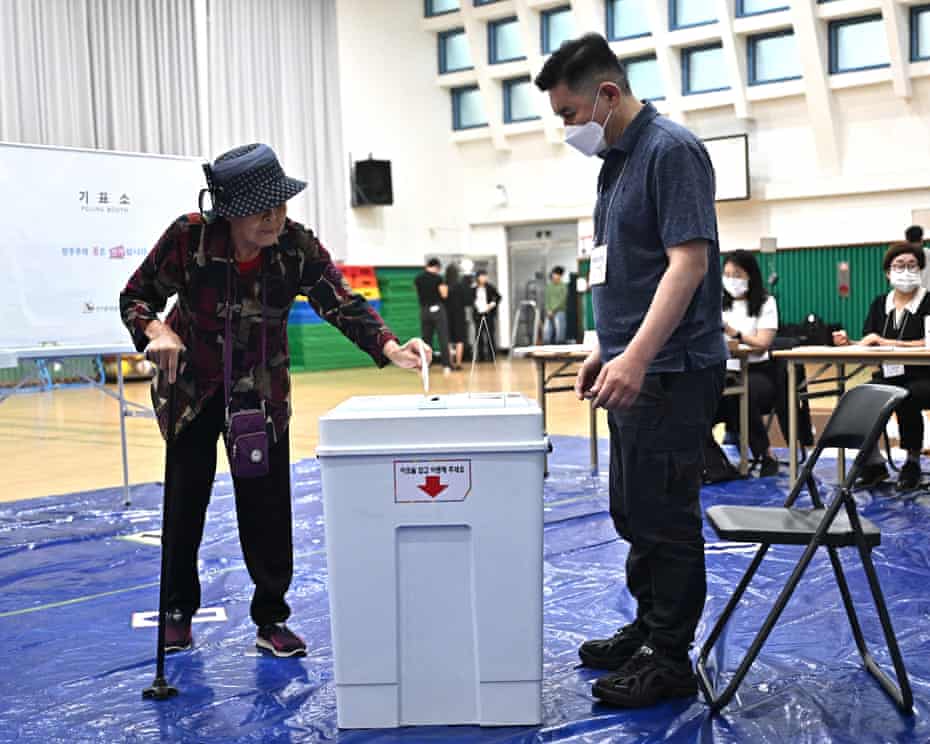Millions of South Koreans are heading to the polls in a historic snap presidential election, following the dramatic impeachment and removal of President Yoon Suk Yeol. The former conservative leader now awaits trial on rebellion charges, stemming from his abrupt and widely condemned attempt to impose martial law last December.
The election, one of the most consequential in the country’s democratic history, has exposed deep political rifts and civic unrest, with citizens choosing between starkly contrasting visions for South Korea’s future. Pre-election polls suggest liberal candidate Lee Jae-myung holds a strong lead over conservative contender Kim Moon Soo, as public anger toward the Yoon administration continues to simmer.
A Nation at a Crossroads
The fallout from Yoon’s martial law order triggered months of mass protests and counter-protests, revealing a nation divided. His impeachment and subsequent dismissal created a leadership vacuum that disrupted diplomatic engagements and shook financial markets.
Today’s vote marks a pivotal moment in the resilience of South Korean democracy. However, analysts caution that political polarization may persist beyond the ballot box, regardless of who wins. “The divisions Yoon inflamed won’t vanish overnight,” said political analyst Han Soo-jin. “This election is just the beginning of the healing process.”
More than 15 million voters, about 35% of South Korea’s 44.4 million eligible citizens, cast early ballots during a two-day advance voting period last week. Polls opened at 6 a.m. at over 14,000 polling stations nationwide and will close at 8 p.m., with results expected as early as midnight. The winning candidate will be sworn in immediately, serving a full five-year term with no transition period.
Lee Jae-myung: Reformist or Risk?
Lee Jae-myung, the liberal frontrunner, has campaigned on promises to revitalize the economy, reduce inequality, and heal national divisions. In his final rally at a park in Seoul, Lee warned that a conservative victory would embolden what he calls “rebellion forces.”
“If they somehow win, that would mean the return of the rebellion forces, the destruction of democracy, the deprival of people’s human rights, the normalization of martial law and our country’s downfall into a backward, third-world nation,” Lee declared.
A former child laborer with a rags to riches story, Lee has long been a polarizing figure. He currently faces multiple criminal trials, including allegations of bribery and involvement in a property development scandal. While courts have postponed hearings until after the election, a recent Supreme Court decision ordering a retrial on an election law violation has raised questions about whether presidential immunity would shield him from legal consequences if elected.
Critics describe Lee as a populist prone to inflammatory rhetoric and opportunistic shifts in policy. Supporters, however, see him as a reformist outsider with the boldness to tackle South Korea’s entrenched economic inequality and political corruption.
Kim Moon Soo: Upholding Conservative Values
Conservative candidate Kim Moon Soo, a former labor minister under Yoon, has struggled to distance himself from the disgraced ex-president and unite the fractured People Power Party. Kim has positioned himself as a stabilizing force, warning that a Lee presidency would consolidate unchecked power and deepen political retaliation.
“Lee is now trying to seize all power in South Korea and establish a Hitler-like dictatorship,” Kim said at a campaign stop in Busan. He has accused Lee of planning to use his party’s parliamentary majority to protect himself from prosecution and suppress dissent.
Kim’s message has resonated with some voters, but he has failed to gain traction among moderates, many of whom remain disillusioned by the Yoon administration’s authoritarian overreach.
Foreign Policy: Unity in Pragmatism
In foreign affairs, both candidates have struck cautious tones, avoiding bold pronouncements as South Korea navigates complex challenges, including U.S. President Donald Trump’s America-first policies, rising tariffs, and North Korea’s expanding nuclear arsenal.
Lee has emphasized the importance of South Korea’s alliance with the United States and expressed commitment to strengthening trilateral cooperation with Washington and Tokyo, positions that closely mirror those of the conservative establishment.
“There’s not much room for sweeping change in foreign policy,” said international relations expert Choi Min-kyu. “The challenges are too immediate, too serious, and demand bipartisan continuity.”
A Tense Road Ahead
Regardless of who wins, the next president will inherit a fragile economy, ongoing legal controversies, and a fractured electorate. With the nation still reeling from Yoon’s tumultuous tenure, the incoming administration will face pressure to rebuild trust in government institutions and reassert democratic norms.



